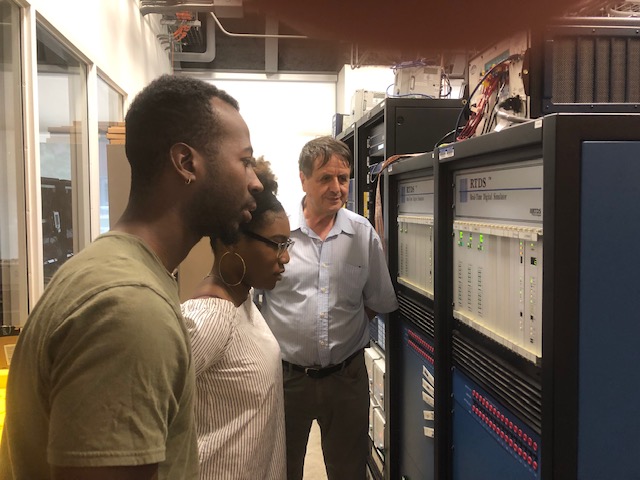Meet Radian Belu, Ph.D., DeShon Swafford and Trinity Reed
Faculty-Student Team helped develop reliability and safeguards for power grids
Protecting the electrical power grid and enhancing the reliability of critical infrastructure are primary concerns of community utilities, particularly during extreme weather events when electrical power outages often occur. Severe power grid damage can lead to large-scale service interruptions and hinder first responders and recovery operations.

DeShon Swafford, from left, Trinity Reed and Radian Belu, Ph.D., participated in the U.S. Department of Homeland Security Summer Research Team Program at the Critical Infrastructure Resilience Institute at the University of Illinois at Urbana-Champaign. They studied ways to build resilience and protect power grids from all types of harm, including extreme weather and cyberattacks.
In the summer of 2019, a team of researchers from Southern University and A&M College of Baton Rouge (SUBR), were paired with researchers at the Critical Infrastructure and Resilience Institute (CIRI), a U.S. Department of Homeland Security Center of Excellence, housed at the University of Illinois at Urbana-Champaign (UIUC) to study and analyze ways to build resilience and protect power grids from all types of harm, including extreme weather and cyberattacks.
Under the mentorship of their professor, Radian Belu, Ph.D., Associate Professor of Electrical Engineering at SUBR, engineering graduate student, DeShon Swafford, and undergraduate student, Trinity Reed, participated in the U.S. Department of Homeland Security (DHS) Summer Research Team (SRT) Program for Minority Serving Institutions.
The SRT Program is designed to increase scientific leadership at Minority Serving Institutions in DHS research areas. The program provides faculty and student research teams the opportunity to conduct research at university-based DHS Centers of Excellence.
At UIUC’s Critical Infrastructure Resilience Institute, Belu, Swafford and Reed conducted research under the direction of mentors David Nicol, Ph.D., and Alfonso Valdes. As a result of the summer program, Belu wrote a research proposal which was then awarded for his SUBR team to continue the summer project. Swafford completed a master’s degree in engineering in 2019 and subsequently secured a position with NextEra® Energy FPL in Jupiter, Florida. Reed continues as an SUBR undergraduate studying electrical engineering and computer science.
During their time at CIRI, Belu, Swafford and Reed assisted with research on mircogrids, single controllable entities that can consume or supply power depending on the total generation and the total load demand. Microgrids allow for the integration of various distributed energy resources. Distributed energy resources, such as wind energy, solar energy, energy storage systems, diesel generators, microturbines and fuel cells, can be combined within microgrids to provide energy to consumers in a sustainable manner and to improve the overall grid resilience.
Swafford initially applied to participate on Belu’s team to learn about microgrids and cyber security. “The advancement of technology always caught my attention, and I wanted to be a part of the movement,” said Swafford. He helped develop, implement and test various microgrid energy management and power scheduling algorithms for several configurations to extend the power supply in extreme events. The team also explored the feasibility of using PowerWorld software for microgrid studies.
“I learned so much pertaining to renewable energy. Also, I learned what will happen if a cyberattack happens on the grid system and ways to prevent the attack,” Swafford said. He recommends the program to others. “Everyone is there to help and wants you to succeed. I met great people and gained everlasting friendships,” he said.
Reed, whose primary field of study is critical infrastructure and cyber security, focused on resiliency of power systems during natural disasters such as hurricanes and earthquakes.
She appreciated the commitment to interns from faculty and staff. “Everyone was nice and welcoming, and I loved that they gave the interns their best. This internship was my first. I did a lot of networking and speaking. I was very shy, and everyone helped me open up more so I could be a well-rounded individual,” said Reed. She completed her first poster presentation, and her team won first place in the Centers of Excellence Summit Student Grand Challenge.
Belu recognized the CIRI’s excellence and prestige in the area of resiliency and sought to collaborate with scientists there while expanding the scope of his research areas. His goal is to strengthen SUBR’s power and energy curriculum through power and energy engineering research in the areas of microgrid operation, grid resilience, service restoration and energy management.
“The multidisciplinary nature of these topics will attract faculty and students from diverse disciplines, creating an opportunity to significantly enhance the SUBR research areas, while at the same time offering opportunities for the curriculum expansion,” said Belu.
To gain the most from the SRT Program, Belu advises participants to be fully committed to the internship, work hard, attend seminars and make contacts. “Use your internship wisely and productively,” he said.
The DHS SRT MSI Program is funded by DHS and administered through the U.S. Department of Energy’s (DOE) Oak Ridge Institute for Science and Education (ORISE). ORISE is managed for DOE by Oak Ridge Associated Universities.
